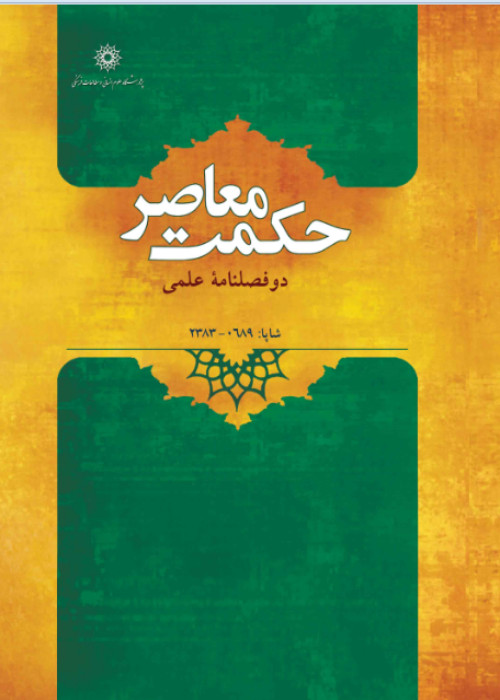Auditory Perception in the view of Mullā Ṣadrā and Neuroscience
Auditory perception, or hearing, is a major human sense, which was investigated by Muslim philosophers and neuroscientists. Muslim philosophers, particularly Mullā Ṣadrā, have provided careful accounts of the issues concerning external senses such as hearing. In his view, auditory perception occurs in the human soul, while neuroscience provides a fully material account of all perceptions, including auditory perception. From a neuroscientific viewpoint, sounds pass through interior layers of the ear to reach auditory neurons, in the course of which they undergo a complicated process leading to auditory perception. However, Mullā Ṣadrā believes that the whole process occurring in the auditory system is just preparatory for perception of sounds by the human soul. This is the soul that creates the true nature of sounds. On his account, the relation between sounds and the inner self is like that between actions and their agents, where actions are done by their agents, rather than that between a passive entity and what it receives. For this reason, Mullā Ṣadrā holds that the account of auditory perception offered by natural scientists is objectionable, since they involve a confusion between preparatory causes and efficient causes. The accounts provided by natural sciences rest content with an elaboration of material stages of auditory perception, while Mullā Ṣadrā believes that perception is non-material in nature, which is just enabled and prepared by those material processes. Accordingly, Mullā Ṣadrā offers the following account: when the soul has a relation with the natural external world through its attachment to the body, it creates a similar image of the external object, where that image is both caused and known by the soul. After the auditory perception, the human soul draws on the images derived from physical entities or those received from the spiritual world (the imaginal world, or ʿālam al-mithāl) creates images in its imaginary perception as well. Contrary to senses that are limited to material entities, imagination extends to the supernatural world as well. Thus, according to Mullā Ṣadrā’s philosophy, imagination includes a number of perceptions, such as perception of sensible entities while no matter is present, their perception in dreams, and imaginal perceptions. Perception of sounds in the absence of any external material sources does not require material tools or organs, since many material features do not exist in that realm. This is comparable to memory in neuroscience, although it has not yet offered a plausible account of conscious selection of memories. Moreover, the hearing that occurs in dreams does not involve an environmental system. Although some people still perceive the waves of the material world in their sleep, this is a very different process from that of sensory audition. In the hearing that occurs in dreams, one might hear an intense sound like thunders, which affects one’s soul just like hearing in the waking state, although it was not perceived by the material organ of hearing; that is, one’s ears. Hearing in dreams is indeed one piece of evidence adduced by Mullā Ṣadrā as an argument for the immateriality of perceptions, but this type of hearing is investigated in neuroscience as a kind of dream. Despite their accuracy, the findings of neuroscience here merely demonstrate that perception occurs with the stimulation of certain cells in the body, but the stimulation does not show whether the area in question is a center for processing and storing information or a pathway through which information is transferred. Also in imaginal hearing, only external sounds of the imaginal world are heard, without being mixed with inner secretions, and the sound in the imaginal world does not require material factors such as waves and frequencies. For Mullā Ṣadrā, if the human imaginative faculty is strong, the relation with the imaginal world can occur in the waking state such that hidden imaginal forms are presented to the person, who will thus be able to hear sounds from the imaginal world. Because of its non-material character, this stage of auditory perception is not subject to neuroscientific investigations. The final stage of auditory perception is intellectual hearing, which is the highest degree of auditory perception, which has degrees of intensity and weakness, just like light. Intellectual hearing has degrees, the lowest of which has traces of imaginal sounds, but the higher we go on the scale of intellectual hearing, we come closer to a realm in which no imaginal properties are involved, a realm of pure perception. In its evolutionary course, intellectual hearing reaches a degree where it perceives profound supernatural ideas in the most translucent form. This is a hearing that emerges with the rise of the acquired intellect (al-ʿaql al-mustafād) and then gradually grows.
Auditory perception , hearing , sound , perception , Soul , Mullā Ṣadrā , neuroscience
- حق عضویت دریافتی صرف حمایت از نشریات عضو و نگهداری، تکمیل و توسعه مگیران میشود.
- پرداخت حق اشتراک و دانلود مقالات اجازه بازنشر آن در سایر رسانههای چاپی و دیجیتال را به کاربر نمیدهد.


